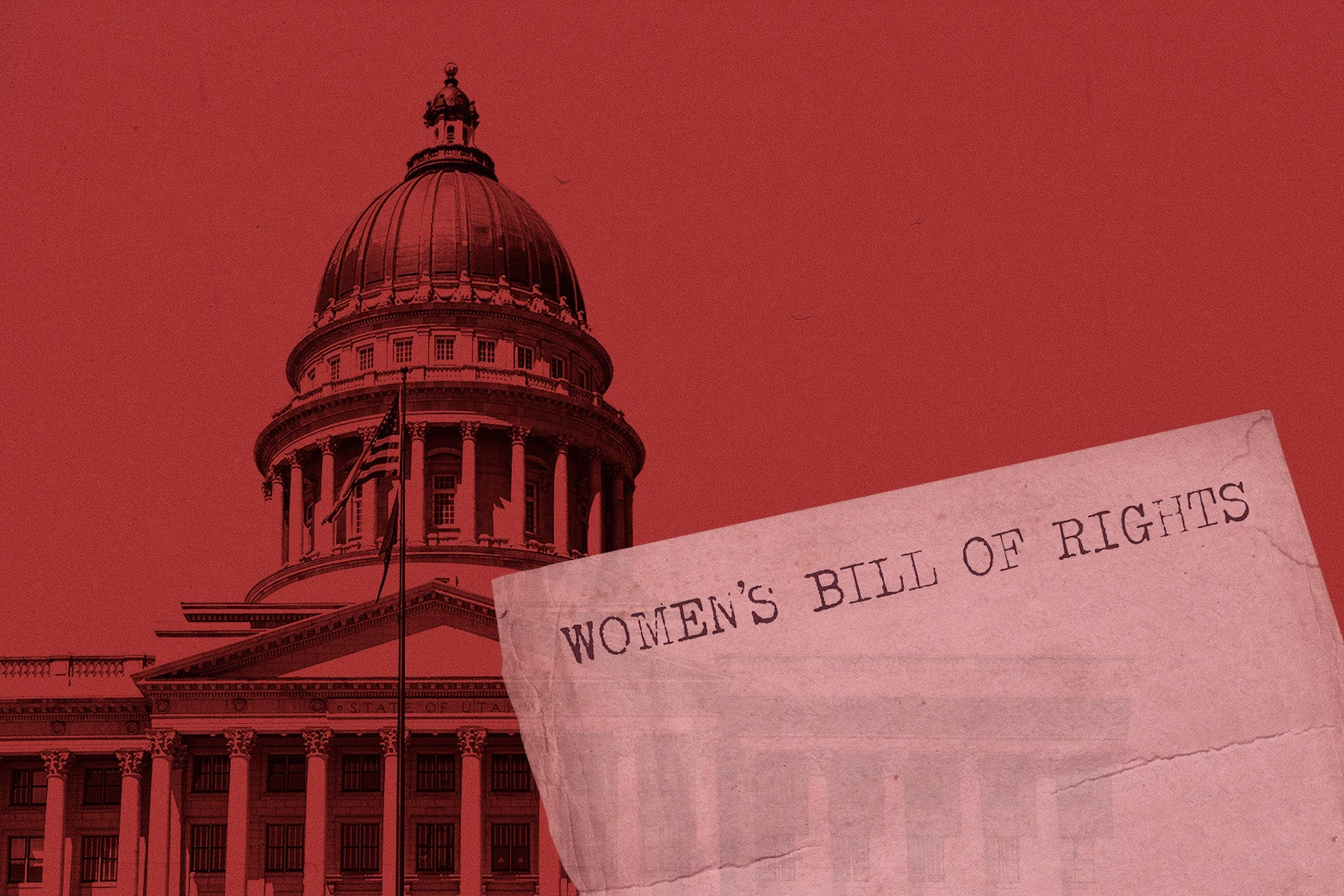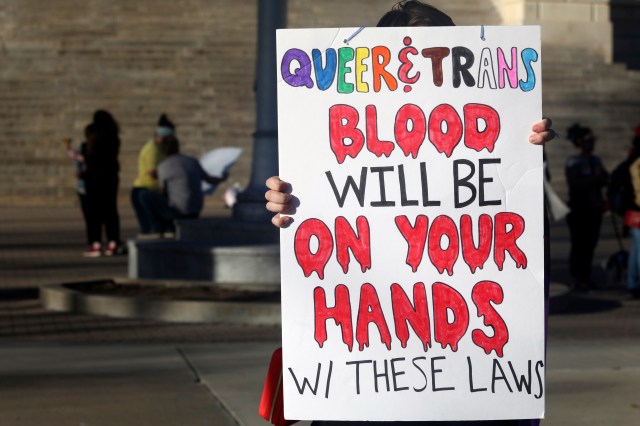
Although state politicians don’t always have the greatest reputation for work ethic, they’ve hit the ground running this year—at least when it comes to attacks on trans and queer life. With over 475 new anti-LGBTQ+ bills introduced in state houses during the first nine weeks of 2024 and 625-plus being tracked in total by a group of journalists and researchers that includes myself, we are in the midst of another record-breaking year for anti-LGBTQ+ legislation. Trans people—particularly trans youth—are the primary focus of the push, but the attacks are starting to expand to include all LGBTQ+ individuals. This year, the hot trends are book bans, obscenity laws that try to define anything queer as “pornographic,” bathroom access bans, and the general end of legal recognition of trans people—an effective way to dehumanize us and force us out of public life.
All of these vectors of assault are concerning, of course, but there’s one emerging tactic that feels particularly insidious: State Republicans across the nation are pushing bills commonly titled the “Women’s Bill of Rights.” You’ll be shocked to learn that contrary to the title, however, Republicans haven’t suddenly started to care about women’s equality or agency—they just want to use that banner as cover for stripping away our rights as LGBTQ+ individuals. The branding might seem ridiculous given the party’s recent history with actual women’s bodily autonomy, but make no mistake: The push has already had alarming success, with six states having enacted these laws and policies in 2023. And in the first eight weeks of this year, we have seen 17 states introduce bills that include this language, with Utah even enacting one such bill into law. As a legislative researcher working on tracking and monitoring anti-LGBTQ+ legislation, to say I find this alarming is a major understatement.
The primary function of these so-called women’s rights bills is to eliminate the legal recognition of trans people by defining sex as an “individual’s biological sex, either male or female, at birth” throughout the entirety of the state’s laws and policies. For trans people, this move is devastating, since, in most circumstances, it removes our ability to have updated sex/gender markers on our driver’s licenses, birth certificates, and other state-regulated documentation. Having a driver’s license that matches the gender you identify as and are perceived as not only offers a mental health benefit in terms of official validation, but can be critical for avoiding discrimination during traffic stops and any other time we have to present identification.
If that weren’t bad enough, these bills moreover explicitly grant power to the state government to create and enforce policies that would discriminate against trans people regarding their use of locker rooms, use of bathrooms, prison placement, participation in sports, and being anywhere that might enforce a gender binary. This is all done in the name of “protecting” women—evoking the fictitious boogeyman that all trans women are predators that seek to harm cisgender women, who are thus in need of protection. But is this truly protecting them? How does forcing a trans man with a full beard into the women’s restroom actually help anyone? These bills treat trans women as if we are a threat for merely existing in a space with cis women, while in actuality, we just want to be able to use the restroom in peace.
As with other culture war waves of legislation, these bills are part of an organized effort by right-wing think tanks and activist groups to curtail women’s and LGBTQ+ rights. The language of these bills originates from a model bill created by the Independent Women’s Forum, the Independent Women’s Law Center, and the Women’s Liberation Front. These organizations are known for pushing anti-abortion stances and, in the case of the IWF, promoting a Christian nationalist agenda—including Project 2025, the comprehensive conservative plan, should a Republican win the next presidential term, to impose their values on all Americans, including a national abortion ban, banning emergency contraceptives, labeling anything related to LGBTQ+ people as “pornographic,” and outlawing pornography entirely.
One of the most high-profile voices in this movement is Riley Gaines, a University of Kentucky collegiate swimmer who says she is a “leader defending women’s single-sex spaces” under the reasoning that she is “standing up for women’s safety, privacy, and equal opportunities”—a mission that emerged after tying in fifth place with trans swimmer Lia Thomas in a 2022 NCAA championship match. In a recent article, Gaines offered a supposed justification for these bills, saying, “It’s important to send the message to young girls that they do matter and their privacy and equal opportunities and their safety—they’re worthy of those things.” However, the truth is that these bills guarantee neither equal opportunities nor privacy; in fact, they put woman competitors under a sexist microscope. “Women’s rights” bills rely on a misogynistic logic that claims that any “abnormally” skilled female athlete must be transgender because a girl could never be so strong or fast or talented; only a boy could be. This leads to the inevitable situation in which cisgender girls get accused of being trans because of their talent. And indeed, last month, a teen female athlete in Utah had to be put under police protection due to harassment after a school board member questioned on social media if the girl could be transgender.
Some states take their “women’s bills of rights” even further. Georgia’s version of the bill, HB 1128, would not only eliminate legal recognition of trans people but remove sexual orientation and gender identity from the state’s hate crime statutes—that is, crimes committed in Georgia due to someone’s sexual orientation and gender identity would no longer be considered particularly heinous under the law. Furthermore, the bill explicitly includes medical records, credit information, gendered sports teams, and more in its redefinition of sex, forcing trans people to disclose our sex assigned at birth in all aspects of our lives.
Iowa Republicans took the cake in their version by including a proposal straight out of the Nazi playbook. Although it was ultimately removed due to massive backlash from constituents and activists across the country, Iowa originally included a provision that would require trans people to carry a special gender marker on their driver’s licenses designating that they are transgender. Many people called this the “pink triangle bill,” drawing the striking similarity to Nazi Germany, where LGBTQ+ people were required to wear pink triangles.
Clearly, these bills have little to do with protecting women and everything to do with hurting queer and trans people. But how likely are they to actually pass into law? Throughout the course of 2023, we saw 25 “Women’s Rights” bills introduced in 12 states, with one of those bills introduced in Congress, at the national level. Out of those, four states passed their version of the bill into law. Governors in two states, Nebraska and Oklahoma, issued executive orders with the same goal as the legislation. In analyzing legislative data from 2023, I found that these bills passed 20 percent of the time, making them the fourth most passed type of anti-LGBTQ+ legislation. Some of these laws are currently being fought in court, but they all had almost immediate effects on transgender individuals within those states. Trans people in Tennessee and Kansas found that they are no longer able to update their driver’s licenses and state documentation and, despite pending litigation, remain unable to do so.
In 2024 these bills are being pushed with the full force of the Republican Party. In the first nine weeks of the year, we have seen 26 bills introduced in 18 states. With Utah already passing a transgender bathroom ban that includes language that would end legal recognition for trans people, states have felt emboldened to press forward with their bills. Idaho has passed a bill ending legal recognition of trans people through the House, and it’s now on its way to the Senate. Iowa and West Virginia have also quickly passed their versions of the bill through one chamber and are expected to pass them fully in the coming weeks. Just a few days ago, Louisiana representatives introduced their version of the bill with a shocking 65 sponsors, a whopping 60 percent of the entire chamber. In all my time tracking these bills, I have never seen a legislative body this aligned on an anti-trans bill.
Although “women’s rights” should obviously be a legislative priority for all states, it’s cruel to use the idea as a disguise to push bills targeting LGBTQ+ people. And it’s particularly grotesque to witness legislators using women as an excuse to pass harmful legislation, all the while actively voting against measures that would actually protect them. The branding strategy is a devious one—but it can be resisted. In litigation and debates, of course, but also in the court of public opinion. We can’t let “women’s rights” become the inverse of trans rights. Because that benefits no one but the men who’d like to control both groups.



